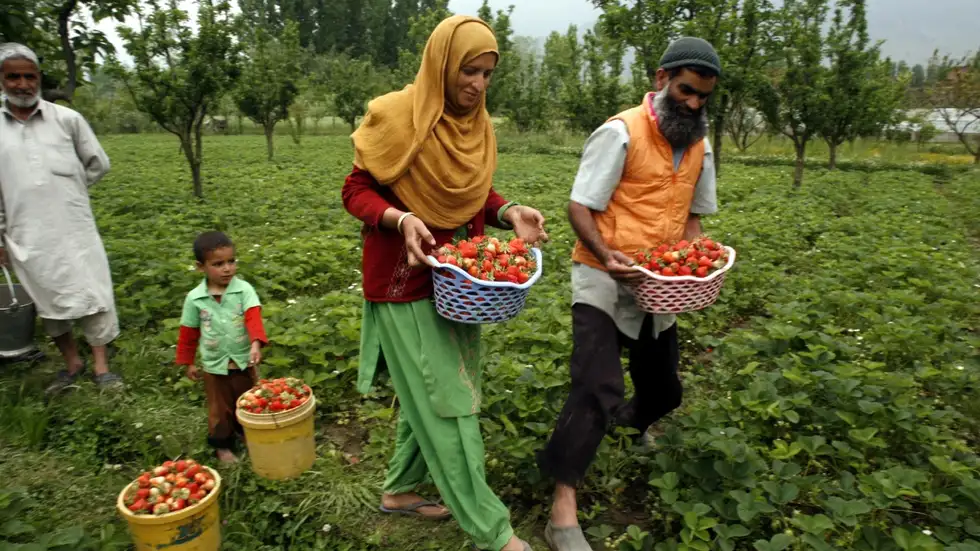August 17, 2024
“In Kashmir, we have taken a decision that if someone joins a terrorist organization, their family members will not get any government job. Similarly, if someone indulges in stone pelting, his family members will also not get a government job.”
– Amit Shah, Home Minister of india
In a recent interview, Amit Shah the Home Minister of india could be seen openly boasting about the decision of their government to keep the Kashmiri youth unemployed. Amit Shah, who was banished from his own birth state of Gujarat by the Supreme Court of india for his central role in the 2002 anti-Muslim pogrom, used the ‘terrorist’ terminology to describe the pro-resistance organisations of Kashmir. While this terminology is not novel and has long been used by the occupying indian state to dismiss Kashmir’s freedom movement as terrorism, in this instance it was used to justify not allowing Kashmiri youth to take up government jobs.

Farmers collect strawberries from a farm in Srinagar, indian-occupied Kashmir. Credit- Weather Channel.
Here is why this matters:
1. Negligible Private Sector Jobs:
The local government, which is controlled and managed by the indian state, is the largest employer in Kashmir, employing 450,000 people. Due to massive militarisation of everyday life, frequent internet suspensions and state enforced curfews in the past seven decades, the private sector in the region was never allowed to develop into a significant job provider. In a region, where all aspects of life are regulated and dictated by the occupation, this of course is no coincidence. In fact, we believe that this has been achieved by conscious efforts of the indian state to keep the Kashmiri youth increasingly dependent on the government for employment. This was starkly visible in the build-up to the abrogation of the semi-autonomous status of Kashmir and ever since. During the world’s longest communication blockade, local businesses that had just started or began to find their feet, were driven into bankruptcy. These business owners were either forced into taking jobs in indian states, preparing for government jobs exams, or taking up hard labour to support their families.
Since this is all part of the larger indian settler colonial project in Kashmir, it has been perpetuated at multiple fronts. As the region was placed under complete communication blockade, , the mineral reserves were auctioned online. This meant that almost all of them were allotted to Indians, leading to loss of all local jobs in this sector. This once again helped the indian state cultivate heavy reliance of the Kashmiri youth on the indian state for employment.
Kashmir’s Fruit Industry Crippled:
The indian state in recent years has led strong efforts to cripple the Fruit industry in Kashmir. Export of Apples and other fruits has always been the backbone of the region’s economy, and this is exactly what has been targeted and massively impacted. Starting with incentivising the cultivation of non-local and non-traditional apple trees which locals lack the know-how of, making them depend on state agencies for directions and guidance. This was further complemented with stranding fruit laden trucks on the Jammu-Srinagar highway for days on end, leading to the fruit going bad and fetching the minimum possible price in indian markets, which are the only permissible export markets. Along with this, the indian state has also been allowing a heavy influx of Iranian apples, which drives down the demand for Kashmiri apples and in turn the rates.
What exactly is the indian state doing?
1. Firing Kashmiris with a Voice:
In recent years, the indian state has increasingly fired Kashmiris from government jobs for dissenting or criticizing its policies. Circulars regulate the social media activities of all government employees, leading to the dismissal of hundreds for non-compliance. Many long-serving employees, including those in teaching and health services, have lost their jobs and pensions. Following the abrogation of Article 370, a new law allows the government to dismiss any employee deemed a “threat to national security,” effectively criminalizing dissent.
Junaid Ahmed (name changed) shared his uncle’s story: a teacher who worked on an ad-hoc basis for seven years (was paid a salary of $25 – $35 per month during that time) before being regularized a decade ago. He was recently dismissed under the new law, losing his pension and benefits. Now, he struggles to support his family through private tuitions, which are also threatened by the rise of Indian edtech startups. Junaid’s uncle was dismissed for attending a 2016 demonstration demanding the return of Maqbool Bhat and Afzal Guru’s remains, which he barely remembers.
Dismissals also extend to relatives of those involved in Kashmir’s freedom struggle, impacting livelihoods and leading to property seizures and house demolitions. Aashiq Ahmad Sheikh (name changed), dismissed from the Jammu and Kashmir Police Service last year, suffered due to his brother’s alleged involvement with a rebel group. His brother disappeared in 2008, and six years later, a photo showed him among rebels killed in what Aashiq suspects was a staged encounter. Aashiq believes that his and his family’s insistence of this being a fake encounter was the real reason for his dismissal.
This crackdown has seen many Kashmiris lose their jobs and livelihoods weekly, under vague accusations of “national security” and “anti-national activities,” reflecting a broader suppression of dissent in the region.
2. Denying Police Verification Even After Qualification of Exams:
In recent years, hundreds of Kashmiri youth who passed the State Public Service Commission and Service Selection Board exams for government jobs have faced extensive background checks by Indian police and intelligence. The pervasive freedom sentiment in Kashmir often leads to links being found between these youth and the freedom movement, resulting in job denial. This contributes to high unemployment and acts as psychological harassment. Candidates spend years preparing, only to be denied employment.
Ghulam Nabi (name changed) shared his story: his youngest uncle went missing in 1990, rumored to have joined rebels and later tortured to death. Despite no contact with his uncle, Ghulam’s verification for a government job was denied due to this connection. “What have I done? I have a family of three to provide for,” he says.
Ishfaq Ahmad (name changed) faced a similar fate. Despite moving out of his parents’ house five years ago, his verification was denied due to his father’s minor past affiliation with Jamat e Islami, a group banned in 2019. Ishfaq laments, “An officer even suggested that if my father were dead, my verification might have been approved. What sort of world do we live in?”
There is no doubt that the indian wishes to rapidly advance its settler colonial project in Kashmir to drive a demographic change as soon as possible. While throughout most of the history of india’c occupation of Kashmir, this has been done through brute force and killings, they are now also taking a pivot for measures that seem softer at the outset. However, even these tactics are not novel to Kashmir and Kashmirs. During the occupation of Mughals as well, Kashmiri men were forbidden from joining the army, as the Kings feared that they would have used the training to rebel against the occupation. Hence, calling this “Weaponization of Unemployment” anything other than another violent face of settler colonialism would be factually and logically incorrect. The indian state is now complementing the militarisation, killings, bombings and house demolitions with unemployment, aiming to drive Kashmir’s economy and population into poverty and ultimately, starvation at the hands of the indian state.
Stay in touch with Stand with Kashmir.
Stand With Kashmir (SWK) is a Kashmiri-driven independent, transnational, grassroots movement committed to standing in solidarity with the people of indian-occupied Kashmir in ending the indian occupation of their homeland and supporting the right to self-determination of the pre-partition state of Jammu and Kashmir. We want to hear from you. If you have general inquiries, suggestions, or concerns, please email us at info@standwithkashmir.org.


Leave a Reply